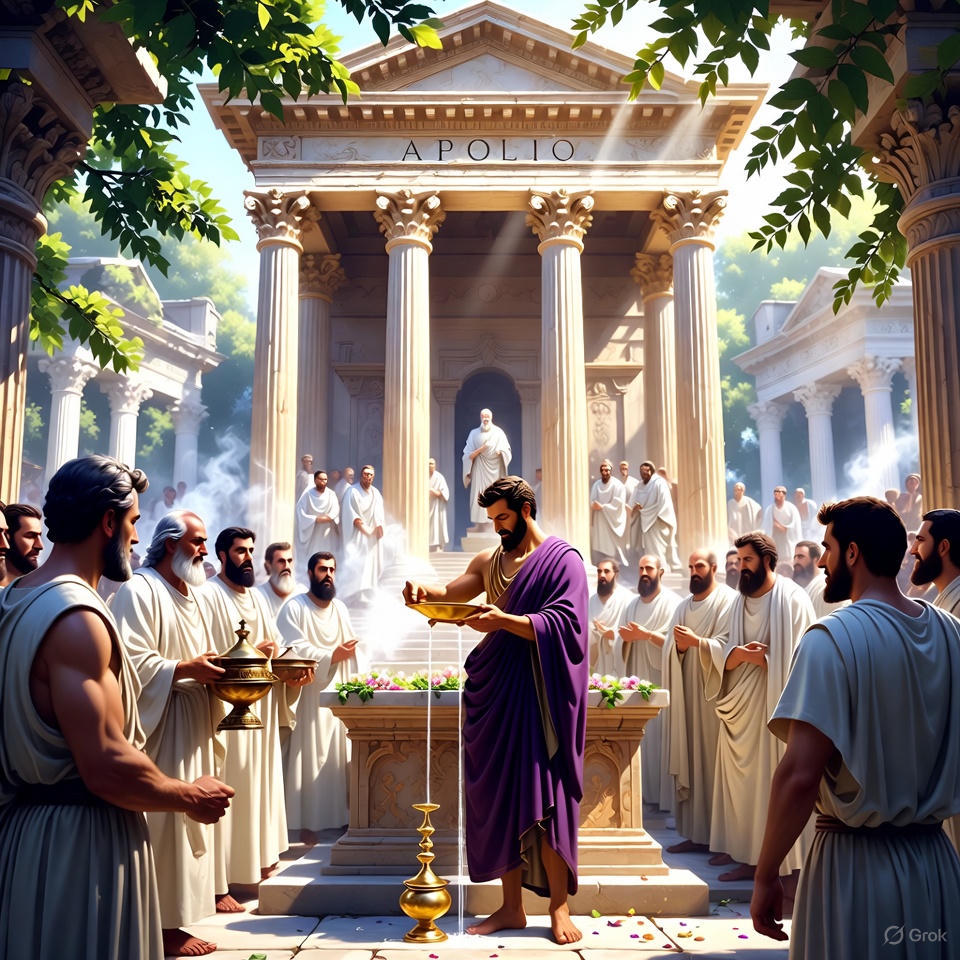In the crisp autumn chill of November 6, 355 AD, as the leaves of ancient oaks whispered secrets to the wind across the sprawling villas of Milan, a moment unfolded that would ripple through the corridors of power like a stone skipped across the Tiber. The Roman Empire, that colossal beast forged in the fires of conquest and tempered by the ceaseless grind of bureaucracy, stood at a precarious crossroads. Emperor Constantius II, a man whose gaze could freeze the blood of senators and whose ambitions stretched from the misty highlands of Britannia to the sun-baked sands of Persia, gathered his inner circle in the opulent halls of the imperial palace. There, under the flickering glow of oil lamps that cast long shadows on marble columns veined with lapis and gold, he did the unthinkable: he elevated his young cousin, Flavius Claudius Julianus—better known to posterity as Julian the Apostate—from obscure scholar to Caesar of the West.
This wasn’t merely a family affair or a pragmatic shuffle of titles; it was the spark of a philosophical conflagration, a defiant echo of the old gods against the rising tide of Christianity that Constantius himself championed with the fervor of a zealot. Picture it: the air thick with the scent of incense and polished bronze, courtiers in togas stiff with starch and suspicion, and at the center, a lanky 23-year-old with a philosopher’s beard and eyes that burned with the quiet intensity of one who had pored over Plato by candlelight while his kin plotted in the dark. Julian, raised in the shadow of massacre—his father and uncles slain in a purge by Constantius’s father, Constantine the Great—had been shuttled from one remote estate to another, his education a clandestine feast of Hellenic texts smuggled past Christian tutors. On that fateful November day, as Constantius’s heralds intoned the words of proclamation, Julian knelt not in ambition, but in a mixture of dread and destiny. Little did he know that this act would propel him into a whirlwind of campaigns, reforms, and a brief, blazing reign that would challenge the empire’s soul.
To truly grasp the weight of this proclamation, we must wind back the threads of history to the fractured tapestry of the late Roman Empire. The year 355 AD marked the twilight of Constantius’s sole rule, a period when the empire groaned under the strain of endless wars and internal rot. Born in 317 AD as the second son of Constantine the Great—the emperor who had bridged pagan Rome to Christian Byzantium—Constantius had inherited a realm already divided. His father, that towering figure whose vision at the Milvian Bridge in 312 AD (where he claimed to see a cross in the sky with the words “In this sign, conquer”) had tilted the empire toward Christianity, died in 337 AD amid whispers of poison and betrayal. The aftermath was a bloodbath: Constantine’s sons turned on their kin, executing Julian’s father Julius Constantius and uncles on flimsy charges of treason. Young Julian, barely six, and his half-brother Gallus survived only by the emperor’s capricious mercy, confined to isolated villas in Cappadocia and later Macellum, where they were schooled in the Christian faith but secretly devoured the forbidden fruits of classical learning—Homer, Hesiod, and the Neoplatonists who whispered of a divine hierarchy beyond the Nazarene’s singular god.
Constantius, ever the survivor, consolidated power ruthlessly. By 350 AD, he faced a usurper in the form of Magnentius, a burly Frankish general who had slain the puppet emperor Constans in Gaul and proclaimed himself Augustus. The empire splintered: the West under Magnentius’s iron fist, the East under Constantius’s unyielding grip. Gaul, Hispania, and Italia teetered on the brink, their legions restless and their cities plagued by famine and barbarian raids. It was in this cauldron of chaos that Constantius turned to his cousins. Gallus, elevated to Caesar in 351 AD, had proven a disaster—his arrogance led to purges in Antioch that alienated the court, culminating in his execution in 354 AD on trumped-up charges. With Gallus’s head rolling, Constantius’s gaze fell upon Julian, the last of the Constantinian bloodline, tucked away in Athens studying rhetoric under the likes of Prohaeresius and Libanius. Whispers from spies painted Julian not as a threat, but as a malleable tool: a bookish youth who could be molded into a subordinate administrator, a counterweight to Magnentius without the risk of another Gallus.
The summons came in the summer of 354 AD, abrupt as a summer storm. Julian, immersed in the Acropolis’s marble echoes, was yanked from his studies and paraded through Constantinople in a charade of honor. Constantius, ensconced in Milan—then Mediolanum, the bustling hub of the Western provinces with its amphitheaters echoing the roars of gladiatorial ghosts and its forums alive with merchants hawking spices from Serica—watched his cousin with a predator’s calculation. Julian arrived in November, the air biting with the promise of winter, his mind a whirlwind of trepidation. The palace, a labyrinth of frescoed walls depicting Apollo’s triumphs and Venus’s graces (ironic harbingers of Julian’s future affections), buzzed with intrigue. Senators like the scheming Eusebius, bishop of Nicomedia’s successor in influence, plotted in alcoves, while Germanic guards with horned helmets stood sentinel, their loyalty bought with gold denarii debased by inflation.
The proclamation itself was a spectacle of imperial theater. On November 6, as dawn’s pale light filtered through the atrium’s oculus, Constantius donned his purple-trimmed cloak, the *paludamentum* that symbolized command over legions. Flanked by praetorian prefects and magistri militum—generals like Arbitio, whose scarred face told tales of Persian frontiers— he ascended a dais in the audience hall. Julian, clad in a simple tunic edged with imperial gold, was led forward by chamberlains whose whispers urged obeisance. The emperor’s voice, trained in the cadences of oratory, rang out: “Flavius Claudius Julianus, blood of the divine Constantine, we name thee Caesar of the West, guardian of Gaul and Hispania, to stand as our right arm against the rebel Magnentius.” The court erupted in choreographed applause, laurel wreaths pressed into Julian’s hands, and libations poured to the Lares and Penates—though Constantius’s prayers were murmured to the Christian God.
But beneath the pomp lurked layers of subtext. Constantius intended Julian as a figurehead, a scholarly prefect to rally the Gallic nobility without real power. The Caesar’s authority was circumscribed: no independent treasury, legions loyal to the Augustus alone, and a cohort of Constantius’s spies embedded in his entourage. Julian, however, was no pawn. His education had been a rebellion in ink: in the solitude of his exiles, he had penned secret hymns to Helios, the sun god who embodied Platonic reason, and corresponded with pagan mystics like Maximus of Ephesus. As he rose from his kneel, his mind raced with the words of Sallust: “The renown which riches or beauty confer is fleeting and frail; mental excellence is a splendid and lasting possession.” This moment, he later reflected in his writings, was both a chain and a key.
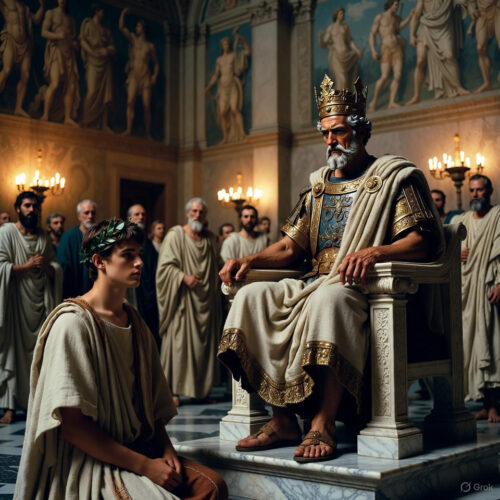
The weeks following the proclamation thrust Julian into a maelstrom of military necessity. Dispatched to Gaul in late 355 AD with a modest force of 360 men—more escort than army—he crossed the Alps amid blizzards that howled like vengeful Furies. Gaul was a wasteland of woe: villages razed by Alamanni raiders, Frankish warbands prowling the Rhine’s fog-shrouded banks, and cities like Augustodunum (Autun) pleading for relief from Magnentius’s tax collectors. Julian, arriving in Vienne by December, found himself not as puppet but as reluctant savior. The local bishops, sensing opportunity in this Christian-raised Caesar, showered him with flattery, but Julian’s heart stirred with older rhythms—the druidic echoes in Gaul’s oak groves, the Mithraic altars hidden in legionary forts.
His first test came swiftly. In early 356 AD, as spring thawed the frozen rivers, Alemannic tribes under Chnodomarius— a chieftain whose name meant “little freedom” in their tongue—swept across the Rhine, sacking Divodurum (Metz) and threatening the heart of Gaul. Julian, with scant experience beyond philosophical disputations, rallied what troops he could: comitatenses (field armies) thinned by desertions and limitanei (border guards) demoralized by neglect. At the Battle of Reims, on a muddy plain slick with March rains, he orchestrated a feigned retreat that lured the barbarians into a trap. His cataphracts—mailed cavalry thundering like bronze avalanches—flanked the foe, shattering their wicker shields and sending Chnodomarius fleeing with a spear through his thigh. The victory was no fluke; Julian had pored over Caesar’s *Gallic Wars* by lamplight, adapting the divide-and-conquer tactics to his hybrid force of Romans and Gothic foederati.
Word of the triumph raced to Milan like wildfire on the cursus publicus, the empire’s pony-express relay of couriers. Constantius, pleased yet wary, dispatched reinforcements but also edicts curtailing Julian’s autonomy: no minting of coins in Julian’s name, no independent diplomacy with the Sarmatians. Yet Gaul adored its new Caesar. In Lyons, he reformed the grain dole, slashing corruption that had inflated prices to 50 sesterces a modius—eight times the norm—by executing venal officials in public spectacles that blended Roman severity with Gallic flair. He rebuilt aqueducts felled by siege, their lead pipes humming anew with Nemausus’s waters, and patronized schools where boys declaimed Virgil amid the scent of fresh-cut vellum. Julian’s letters from this period, preserved in fragments by later historians like Ammianus Marcellinus, reveal a man awakening: “The gods have thrust upon me the scepter I neither sought nor desired, yet in wielding it, I glimpse the harmony of the spheres.”
As 356 deepened into summer, Julian’s campaigns escalated into legend. The Battle of Strasbourg (Argentoratum) on August 2 stood as his masterpiece. Facing 35,000 Alemanni—warriors adorned in torcs of twisted gold and wielding franciscas that spun like deadly boomerangs—Julian commanded just 13,000, many raw recruits. The Rhine’s banks, choked with willows and mist, became a chessboard of desperation. When his left flank buckled under a furious charge, Julian himself seized a standard from a falling aquilifer and rallied the line, his voice booming quotations from the Iliad: “Rage, goddess, sing the rage of Achilles!” The Roman heavy infantry, locked in testudo formation, held as cataphracts wheeled and struck, their kontos lances piercing the barbarian phalanx. By dusk, 6,000 Alemanni lay dead in the shallows, their king captured, and Julian’s legions hailed him *restaurator Galliarum*—restorer of Gaul. Booty flowed: 20,000 cattle, vast herds of horses, and slaves whose ransom filled the treasuries of Trier.
Constantius, from his Persian fronts where he dueled Shapur II’s immortals in the shadow of Ctesiphon’s walls, grew uneasy. Reports from prefects painted Julian not as subordinate but sovereign: erecting statues of himself in forums, negotiating treaties with the Salian Franks that bypassed Milan, and—whispers hinted—tolerating pagan rites in rural shrines. The emperor’s court, a viper’s nest of eunuchs like the chamberlain Eusebius and bishops like Acacius of Caesarea, fanned the flames. “The boy apes his uncle’s purple,” sneered one missive, referencing Constantine’s grandeur. Yet Julian pressed on, wintering in Parisii (Paris), where he penned his first public manifesto, *The Beard-Hater*—a satirical jibe at clean-shaven courtiers that masked deeper barbs at Christian asceticism.
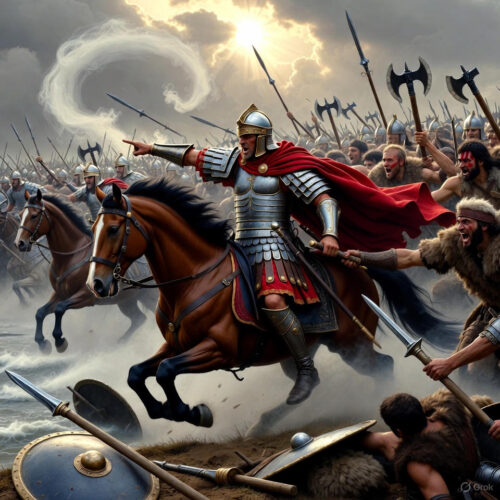
By 357 AD, Julian’s Gaul was a phoenix rising. He recaptured Cologne from Magnentius’s holdouts, its gates groaning open after a siege where Greek fire— that Byzantine naphtha inferno—licked the ramparts. Economic revival followed: he standardized weights in markets from Burdigala (Bordeaux) to Lugdunum (Lyon), curbing the clippers who shaved silver from denarii until they rang hollow. Temples to Mercury and Minerva, shuttered under Constantius’s edicts, saw cautious reopenings; Julian attended Mass publicly but in private sacrificed to Hermes, his patron of eloquence. His administration gleamed with merit: promoting equestrians over senators, rewarding valor with villas seized from traitors. Ammianus, the soldier-historian who served under him, marveled at this “prince who shared the hardships of the meanest, sleeping on the ground with his cloak for cover.”
The rift with Constantius widened like a fault in the Alps. In 360 AD, as Persian threats loomed, the emperor demanded Julian’s best Illyrian troops for the Eastern front. In Paris, the legions—fiercely loyal after years of victories—revolted at the order, proclaiming Julian Augustus on the spot. Bonfires blazed along the Seine, garlands of oak leaves crowned his brow, and the cry “Augustus! Augustus!” drowned the winter winds. Julian, torn between duty and the mob’s roar, accepted with feigned reluctance, minting coins that boldly omitted Constantius’s name. Civil war brewed: envoys crossed the empire like poisoned arrows, while soothsayers read entrails for omens.
The clash came in 361 AD, but not before Julian’s march eastward became a pilgrimage of revival. Through Pannonia’s haunted forests, where werewolves of legend prowled, he gathered allies: pagan intellectuals like Sallustius and soldiers weary of Constantius’s puritanical court, where actors were flogged for “immoral” plays. At Naissus (Nis), he defeated Alamanni remnants, their defeat marked by a triumph where captive kings walked in chains behind his chariot. By May 361, Constantius lay dying in Mopsuestia, his last words a grudging recognition: “Let Julian rule.” The apostate’s path cleared, he entered Constantinople on December 11, 361 AD, hailed by a city drunk on hope.
Julian’s reign, though truncated by his death in 363 AD during a Persian campaign, was a comet’s arc of innovation. He slashed the imperial bureaucracy, dismissing 30,000 redundant officials to curb the court’s gluttony—palaces where peacocks were roasted in honey while peasants starved. Taxes reformed: the hated *aurum coronarium* (crown gold) tribute from cities halved, redirecting funds to roads that snaked from Hadrian’s Wall to the Euphrates. Education universalized; he decreed free schooling in classics, arguing in *Against the Uneducated Cynics* that “true philosophy is the pursuit of virtue through reason, not blind faith.” Paganism he revived not by persecution—Christians numbered half the empire—but by equality: temples received state funds matching churches, and he penned *The Hymn to King Helios*, envisioning a syncretic faith blending Sol Invictus with Neoplatonic emanations.
Yet his apostasy— the “falling away” from Christianity—defined him. Raised in the faith, Julian rejected it intellectually: in *Against the Galileans*, he lambasted its exclusivity, praising Judaism’s antiquity but decrying Christianity’s “corpse-worship” and monastic excesses. He banned Christians from teaching classics, lest Homer’s gods corrupt youth, sparking riots in Syrian streets where monks hurled stones at his litter. His Persian expedition, launched in 363 AD to eclipse Alexander, ended in hubris: at Ctesiphon, his supply lines snapped, and in a moonless June night, an Arab spear—perhaps from a Christian defector—felled him. Carried to his tent, he gasped to companions, “Tell the Galilaeans I strove for the old ways,” before expiring at 31.
The empire mourned and rejoiced in equal measure. Jovian, his successor, rescinded the pagan edicts, but Julian’s legacy endured: the *Codex Theodosianus* later echoed his administrative efficiencies, and his writings—over 100,000 words surviving—inspired Renaissance humanists like Erasmus, who saw in him the bridge from antiquity to modernity. Procopius’s *Secret History* slandered him as a schemer, but Libanius’s eulogy painted a sage-king. In Gaul, his memory lingered in place names and folklore, a bearded ghost riding the mists.
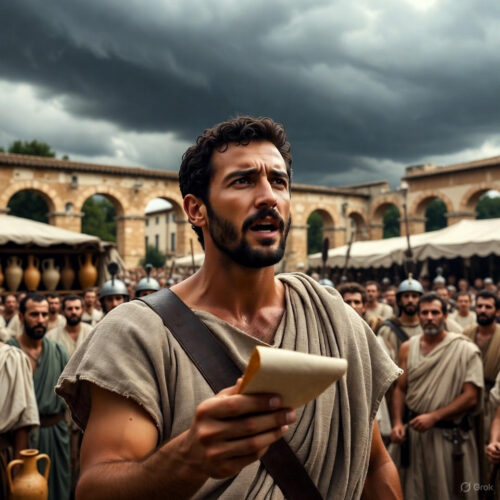
Delving deeper into the socio-economic undercurrents, Julian’s proclamation catalyzed a micro-revolution in Roman governance. Pre-355, Gaul’s *curiales*—the town councilors tasked with tax collection—were bankrupted by Constantius’s demands, fleeing to monasteries or brigandage. Julian’s edicts, issued from his mobile headquarters in a requisitioned villa at Reims, capped assessments at sustainable levels: coloni (tenant farmers) bound to the soil but protected from arbitrary evictions, latifundia owners incentivized to invest in irrigation over hoarding. Archaeological digs at sites like Saint-Bertrand-de-Comminges reveal coins minted under his aegis—solidi of purer gold, stamped with Victory crowning him, circulating briskly in trade with Britain’s tin mines.
Militarily, his innovations reshaped the late Roman army. The *notitia dignitatum*, a later register, credits him with bolstering the *scholae palatinae* (palace guard) with Gallic auxiliaries trained in *contus* (lance) charges, precursors to medieval knights. At Strasbourg, he deployed *ballistae* in mobile wagons, their bolts whistling like harpies to pinion enemy leaders—a tactic borrowed from Trajan’s Dacian wars but refined with Greek engineers from Massilia. His mercy toward defeated foes, integrating 300 Alemanni nobles as *dediticii* (surrendered allies), swelled his ranks without the drain of conscription, a pragmatic humanism echoing Augustus’s policies.
Culturally, Julian was a curator of antiquity. In 362 AD, from Antioch’s sultry groves, he orchestrated the *Misopogon*— “Beard-Hater”—a self-mocking pamphlet against the city’s sybaritic populace, who mocked his philosopher’s whiskers as unfit for an emperor. Yet it doubled as propaganda, aligning him with Diogenes the Cynic and Zeno’s Stoa. He corresponded with the oracle at Daphne, restoring its sacred grove after a Christian bishop’s arson, and in *The Caesars*, a Saturnalian fantasy, he lampooned past emperors: Alexander as a drunken brawler, Constantine as a fox in priest’s robes. These works, circulated on papyrus rolls dyed Tyrian purple, fueled underground salons where Neoplatonists debated the One’s emanations.
The proclamation’s immediate aftermath in 355-356 saw personal trials that humanized the legend. En route to Gaul, Julian’s baggage train bogged in Alpine snows, forcing him to share a mule with a grizzled centurion who regaled him with tales of Theodosius’s Moorish campaigns. In Vienne, he fell ill with fever—perhaps malaria from the Rhone’s marshes—delirious dreams of his father’s ghost urging vengeance. Recovering, he adopted the epithet *Victor*, etching it on milestones that punctuated repaired roads: “Imp. Caes. Iuliano Vict. viae publicae restitutae.” His court, peripatetic as Alexander’s, included a dwarf jester named Secundus who quipped on imperial follies, lightening the tedium of council meetings where maps unrolled like prophetic scrolls.

As the civil tensions peaked in 360 AD, Julian’s acclamation in Paris was a carnival of defiance. The legions, encamped on the Left Bank where Notre-Dame would one day rise, mutinied over transfer orders, smashing the prefect’s edicts and dragging Julian from his bath—mid-ablutions, wrapped in a towel—to the praetorium. There, amid cheers and clashing shields, he donned the diadem, tears streaking his face as he protested, “This is madness!” Yet his speech quelled no riot; instead, it ignited loyalty. That night, seers sacrificed white bulls, their livers read as favorable, and Julian dispatched assassins to Milan—though they arrived too late, as Constantius’s death forestalled fratricide.
In the brief blaze of sole rule, Julian’s reforms touched every stratum. He abolished the *epistole*—secret police warrants that had terrorized dissidents—replacing them with open tribunals. In the courts, he revived the Twelve Tables’ equity, commuting death sentences for debtors to labor on dikes. For the plebs, he subsidized bakeries in Rome, where the *annona* grain ships from Egypt docked laden with Alexandrian wheat. His environmental ethos, rare for antiquity, saw edicts protecting sacred groves: “Let no axe profane the oaks of Dodona, lest the gods withdraw their favor.” In medicine, he patronized Galenists, funding herbal gardens in Tarsus where silphium— that aphrodisiac cure-all— was cultivated anew.
Theological skirmishes added spice to his tenure. At the Council of Rimini in 359 AD, Constantius had coerced bishops to Arianism—a Christ subordinate to God the Father—but Julian ignored it, fostering Trinitarian holdouts like Hilary of Poitiers while courting pagans. His *Letter to the Jews*, penned in 362, lamented the Temple’s loss and urged diaspora communities to rebuild, a geopolitical ploy to counter Christian proselytizing in the Levant. Satirists like Ammianus noted his eccentricities: dining on leeks and honey to emulate Pythagoras, or debating moon phases with astronomers under Jerusalem’s stars.
Julian’s end at Maranga, near the Tigris, was operatic tragedy. On June 26, 363 AD, his phalanx pierced Shapur’s lines, but retreat turned to rout when elephants stampeded through his rearguard. Struck in the side, he staggered to a dry streambed, philosophers clustering like moths to his flame. His last words, as recorded by friends, blended defiance and doubt: “I go to the gods who called me.” Buried in Tarsus, his sarcophagus—adorned with Helios’s rays—became a pilgrim site, though Christians toppled it under Theodosius.
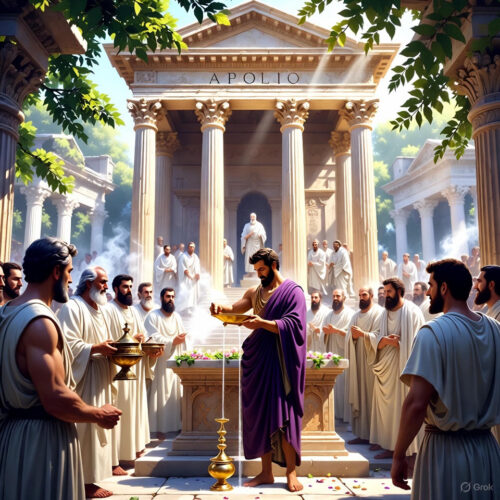
The echoes of November 6, 355 AD, reverberate not just in dusty tomes but in the resilient architecture of personal sovereignty. Julian’s journey—from proclaimed pawn to apostate architect of empire—teaches that even in the jaws of imposed fate, one can carve autonomy through intellect and action. In today’s fractured world, where algorithms dictate destinies and bureaucracies bind like Constantius’s spies, embracing Julian’s ethos means reclaiming agency with deliberate, defiant grace. Here’s how that ancient proclamation translates to tangible empowerment, distilled into specific, actionable insights for forging your path:
– **Cultivate Hidden Knowledge as Your Secret Arsenal**: Just as Julian smuggled Homeric epics past Christian overseers, stockpile expertise in overlooked domains—whether coding in obsolete languages or mastering artisanal trades like woodworking. Dedicate 30 minutes daily to a “forbidden” skill via free online archives, transforming potential obsolescence into a competitive edge that no boss can revoke.
– **Turn Reluctant Roles into Radical Reforms**: When thrust into unwanted positions, like Julian’s Caesardom, audit your immediate sphere for inefficiencies—perhaps streamlining a team’s outdated workflow or negotiating flexible hours. Start with one small audit weekly, documenting wins in a private journal to build momentum, echoing his grain dole revamps that saved Gaul’s economy.
– **Forge Alliances Through Shared Hardship**: Julian’s Strasbourg victory stemmed from bunkering with troops; emulate this by volunteering for gritty projects at work or community, like organizing a neighborhood cleanup. Aim for one such “trench-sharing” act monthly, forging bonds that yield referrals or collaborations, much as his foederati swelled his legions.
– **Wield Satire as Subtle Subversion**: Against courtly barbs, Julian penned the *Misopogon*; channel this by crafting humorous memos or social posts that critique systemic absurdities without alienation. Practice with a weekly “beard-hater” blog entry on personal absurdities, honing wit that disarms critics and rallies supporters.
– **Revive Rituals for Inner Equilibrium**: Julian’s Helios hymns grounded him amid chaos; craft daily micro-rituals—like a 10-minute dawn meditation visualizing solar renewal—to anchor your psyche. Track their impact in a habit ledger, adjusting as needed, to sustain the philosophical fortitude that propelled him from Paris to Persia.
To operationalize this legacy, here’s a 90-day “Julian Forge Plan”: **Week 1-4: Proclamation Phase** – Identify a “Caesar moment” (e.g., a promotion or pivot) and map its constraints; immerse in one classical text (try Plutarch’s *Lives* online) for inspiration. **Week 5-8: Gallic Campaigns** – Execute three tactical wins, like skill audits or alliance builds, logging metrics (e.g., time saved, connections gained). **Week 9-12: Apostate Ascent** – Launch a personal manifesto (a LinkedIn article or vision board) declaring your “old ways” revival, followed by a ritual review to celebrate progress. Measure success not by acclaim, but by the quiet harmony Julian chased: a life where reason reigns, unchained.
In reclaiming that November dawn’s fire, you don’t just honor history—you ignite your own empire, one deliberate decree at a time. The gods of old, or whatever stars you swear by, await your nod.

